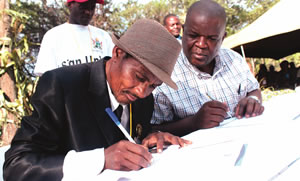de-specification of Mawere was reached in consultation
was done after wide consultation with key Government departme-nts, an official has said.
Secretary for Home Affairs Mr Melusi Matshiya said Government departments namely the Reserve Bank, the Attorney-General’s Office and the police all cleared Mr Mawere of any wrong doing.
He said his Co-Home Affairs Minister Kembo Mohadi held meetings with Shabani Mashava Mine administrator Mr Afaras Gwaradzimba as part of the consultations that culminated in the de-specification of Mr Mawere.
Mr Matshiya was giving oral evidence before a Parliamentary Portfolio Committee on Mines and Energy chaired by Guruve South Member of House of Assembly, Cde Edward Chindori-Chininga (Zanu-PF).
Minister Mohadi, said Mr Matshiya, held meetings with officials of the RBZ, consulted the AG’s Office and considered a report compiled by appointed investigator Assistant Commissioner Samuel Mangoma who absolved Mr Mawere leading to the de-specification.
“That de-specification is a consultative process, we can’t just say ha -a taneta nazvo. (ha-a we are tied of this) If there are allegations of externalisation, you need the opinion of the RBZ, if they say hapana nyaya, (there is no case) well there is nothing we can do.
“It’s our philosophy that investigations of a specified person should be completed within six months,” said Mr Matshiya while explaining the process that they ordinarily take before de-specification.
The committee had called Mr Matshiya to respond to concerns raised by Justice and Legal Affairs Minister, Patrick Chinamasa when he gave evidence early this year before the same committee.
Minister Chinamasa had told the committee that he was not consulted when the decision was made to de-specify Mr Mawere who was facing allegations of externalising more than US$18 million worth of asbestos export proceeds.
Mr Mawere who has since given evidence to the committee was part of the public gallery following yesterday’s proceedings.
In his response, Mr Matshiya said although he had not witnessed a direct meeting involving Minister Chinamasa, adequate consultations were made.
“My minister called Gwaradzimba and had a discussion for one hour and one hopes that he briefed his minister (Chinamasa) and that was before the de-specification,” he said.
“My minister is free to consult the other minister at that political level, he is free to consult even his political party, but when it comes to administration a ministry is not subservient to another ministry.”
Principal Director in the ministry, Mr Jacob Gonese said after a full investigation, it emerged that there was no justifiable case to nail Mr Mawere.
“They (RBZ and AG’s Office) wrote to us that there is no externalisation, we called them to ask if there is any outstanding case and they said no.
“As far as the case is concerned, they failed to put a case against a person specified and they said they would not be able to approach the courts as they had no case,” he said.
Mr Gonese said what had caused the delay in concluding the case was that Mr Mawere was living outside the country.
The committee was also concerned why after the de-specification, management of companies were still under the control of the administrator.
They also asked whether it was permissible to dispose assets of a specified entity under the Prevention of Corruption Act.
Mr Matshiya said while the Act did not allow disposal of assets of a specified person without consulting the owner, it was also important to note that the Reconstruction of State Indebted Companies and Insolvency Act, empowered the administrator do certain things or make certain decisions aimed at reviving the company.
“When a person is specified, his company is ring-fenced to protect it, not that it will not do business but it will be within certain parameters,” he said.
The committee asked whether there were no conflicts between the Prevention of Corruption Act and the Reconstruction of State Indebted and Insolvency Companies Act.
They said while the Prevention of Corruption Act seeks to protect company assets from being disposed, the other law seems to allow the administrator to dispose assets in the name of reconstruction.
In his response, Mr Matshiya said in his view, the two pieces of legislation did contradict each other as they provide checks and balances.
He, however, admitted that they ought to be synchronised to avoid one law “overlapping” into another.
The committee also asked him what he thought should be the way forward to end the dispute.
“My two ministers are unequivocal on that issue.
“They are done with it, issues remaining have to do with reconstruction which is not our area,” he said.







Comments